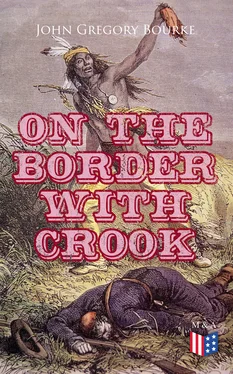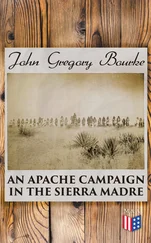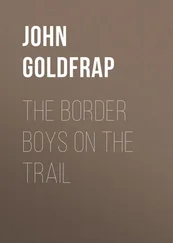The stories that have always circulated in Arizona about the fabulous wealth of her mineral leads as known to the Spaniards have been of such a character as to turn the brain of the most conservative. The Plancha de la Plata, where a lump of virgin silver weighing over two thousand pounds was exhumed; the “Thorn Mine,” or the “Lost Cabin Mine,” in the Tonto Basin; the “Salero,” where the padre in charge, wishing to entertain his bishop in proper style, and finding that he had no salt-cellars ready, ordered certain of the Indians to dig out enough ore to make a solid silver basin, which was placed in all its crudity before the superior—all these were ringing in our ears, and made our task of moving the rocks and débris a very light one.
Disappointment attended our discovery; the assays of the ore forwarded to San Francisco were not such as to stimulate the work of development; the rock was not worth more than seventeen dollars a ton, which in those years would not half pay the cost of reduction of silver.
We were among the very first to come upon the rich ledges of copper which have since furnished the mainstay to the prosperity of the town of Clifton, on the border of New Mexico, and we knocked off pieces of pure metal, and brought them back to Tucson to show to the people there, on returning from our scouts in the upper Gila.
On one occasion the Apaches ran off the herd of sheep belonging to Tully, Ochoa & DeLong, which were grazing in the foot-hills of the Santa Teresa not two miles from town. The young Mexican who was on duty as “pastor” kept his ears open for the tinkle of the bell, and every now and then would rouse himself from his doze to look around the mesquite under which he sat, to ascertain that his flock was all right. Gradually, the heat of the day became more and more oppressive, and the poor boy, still hearing the tintinnabulation, was in a delightful day-dream, thinking of his supper, perhaps, when he half-opened his eyes, and saw leering at him a full-grown Apache, who had all the while been gently shaking the bell taken an hour or two before from the neck of the wether which, with the rest of the flock, was a good long distance out of sight behind the hills, near the “Punta del Agua.” The boy, frightened out of his wits, screamed lustily, and the Apache, delighted by his terror, flung the bell at his head, and then set off at a run to gain the hills where his comrades were. The alarm soon reached town, and the sheep were recovered before midnight, and by dawn the next day were back on their old pasturage, excepting the foot-sore and the weary, too weak to travel.
Our scouting had its share of incidents grave, gay, melancholy, ludicrous; men killed and wounded; Apaches ditto; and the usual amount of hard climbing by day, or marching by night upon trails which sometimes led us upon the enemy, and very often did not.
There was one very good man, Moore, if I remember his name correctly, who died of the “fever”—malaria—and was carried from the “Grassy Plain” into old Camp Goodwin, on the Gila, near the Warm Spring. No sooner had we arrived at Goodwin than one of the men—soldier or civilian employee, I do not know now—attempted to commit suicide, driven to despair by the utter isolation of his position; and two of our own company—Sergeant John Mott and one other, both excellent men—dropped down, broken up with the “fever,” which would yield to nothing but the most heroic treatment with quinine.
In a skirmish-with the Apaches near the head of Deer Creek, one of our men, named Shire, was struck by a rifle ball in the knee-cap, the ball ranging downward, and lodging in the lower leg near the ankle bone. We were sore distressed. There was no doctor with the little command, a criminal neglect for which Cushing was not responsible, and there was no guide, as Manuel Duran, who generally went out with us, was lying in Tucson seriously ill. No one was hurt badly enough to excite apprehension excepting Shire, whose wound was not bleeding at all, the hemorrhage being on the inside.
Sergeant Warfield, Cushing, and I stayed up all night talking over the situation, and doing so in a low tone, lest Shire should suspect that we had not been telling the truth when we persuaded him to believe that he had been hit by a glancing bullet, which had benumbed the whole leg but had not inflicted a very serious wound.
Our Mexican packers were called into consultation, and the result was that by four in the morning, as soon as a cup of coffee could be made, I was on my way over to the Aravaypa Cañon at the head of a small detachment in charge of the wounded man, who was firmly strapped to his saddle. We got along very well so long as we were on the high hills and mountains, where the horse of the sufferer could be led, and he himself supported by friendly hands on each side. To get down into the chasm of the Aravaypa was a horse of altogether a different color. The trail was extremely steep, stony, and slippery, and the soldier, heroic as he was, could not repress a groan as his horse jarred him by slipping under his weight on the wretched path. At the foot of the descent it was evident that something else in the way of transportation would have to be provided, as the man’s strength was failing rapidly and he could no longer sit up.
Lieutenant Cushing’s orders were for me to leave the party just as soon as I thought I could do so safely, and then ride as fast as the trail would permit to Camp Grant, and there get all the aid possible. It seemed to me that there could be no better time for hurrying to the post than the present, which found the detachment at a point where it could defend itself from the attack of any roving party of the enemy, and supplied with grass for the animals and fuel and water for the men.
Shire had fainted as I mounted and started with one of the men, Corporal Harrington, for the post, some twelve miles away. We did not have much more of the cañon to bother us, and made good speed all the way down the Aravaypa and into the post, where I hurriedly explained the situation and had an ambulance start up the cañon with blankets and other comforts, while in the post itself everything was made ready for the amputation in the hospital, which all knew to be a foregone conclusion, and a mounted party was sent to Tucson to summon Dr. Durant to assist in the operation.
Having done all this, I started back up the cañon and came upon my own detachment slowly making its way down. In another hour the ambulance had rolled up to the door of the hospital, and the wounded man was on a cot under the influence of anaesthetics. The amputation was made at the upper third of the thigh, and resulted happily, and the patient in due time recovered, although he had a close call for his life.
The winter of 1870 and the spring of 1871 saw no let up in the amount of scouting which was conducted against the Apaches. The enemy resorted to a system of tactics which had often been tried in the past and always with success. A number of simultaneous attacks were made at points widely separated, thus confusing both troops and settlers, spreading a vague sense of fear over all the territory infested, and imposing upon the soldiery an exceptional amount of work of the hardest conceivable kind.
Attacks were made in southern Arizona upon the stage stations at the San Pedro, and the Cienaga, as well as the one near the Picacho, and upon the ranchos in the Barbacomori valley, and in the San Pedro, near Tres Alamos. Then came the news of a fight at Pete Kitchen’s, and finally, growing bolder, the enemy drove off a herd of cattle from Tucson itself, some of them beeves, and others work-oxen belonging to a wagon-train from Texas. Lastly came the killing of the stage mail-rider, between the town and the Mission church of San Xavier, and the massacre of the party of Mexicans going down to Sonora, which occurred not far from the Sonoita.
Читать дальше












